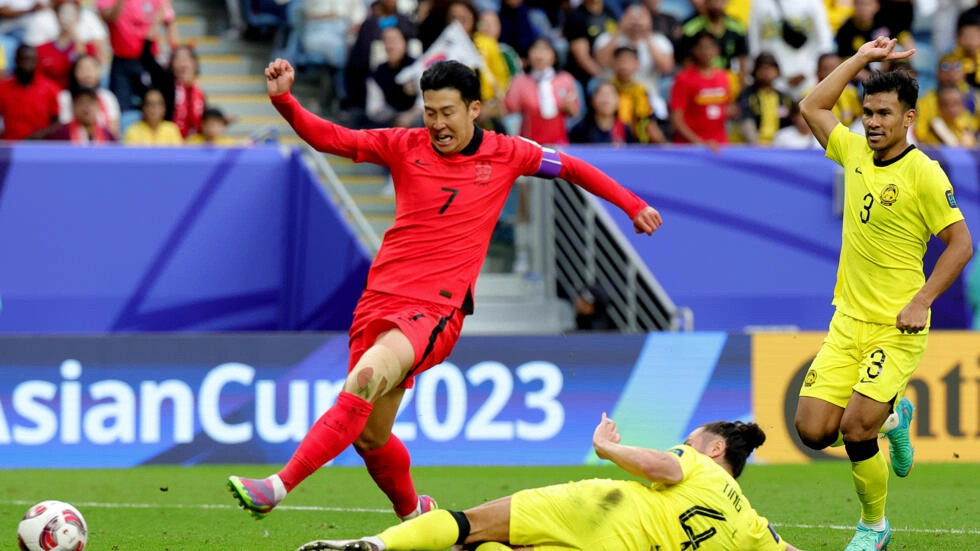In a dramatic turn of events at the Asian Cup, South Korea, led by Son Heung-min, narrowly secured a spot in the knockout rounds, as reported by France24 and Yahoo News. Their journey to the last 16 was marked by a tense 3-3 draw with Malaysia, a team ranked 130th in the world, in Doha. This result led South Korea to advance as Group E runners-up, setting them up against the winner of Group F.

✅ AI Essay Writer ✅ AI Detector ✅ Plagchecker ✅ Paraphraser
✅ Summarizer ✅ Citation Generator
Despite dominating possession, South Korea struggled to capitalize on their opportunities in the first half. Malaysia, on the other hand, displayed remarkable resilience, scoring a last-minute equalizer from Romel Morales in the 105th minute. South Korea’s Jeong Woo-yeong initially gave them the lead, but Malaysia fought back with goals from Faisal Halim and Arif Aiman, with Aiman’s coming from a penalty spot.

The match saw a rollercoaster of emotions and tactics, with South Korea’s Lee Kang-in and Tottenham Hotspur’s Son scoring late goals to put their team ahead, only for Morales to level the score in the final moments. South Korea’s coach, Jurgen Klinsmann, brought on Wolverhampton Wanderers forward Hwang Hee-chan, who has been dealing with a hip injury, as a substitute.
Southeast Asia’s Struggle in the Tournament
The Asian Cup has been a revealing stage for Southeast Asian football teams, highlighting the significant gap they must bridge to compete with Asia’s best. The region celebrated having four teams – Thailand, Vietnam, Indonesia, and Malaysia – in the tournament, the highest number in the Cup’s history. However, the reality of the competition’s intensity soon set in.
Thailand has been the only team from Southeast Asia to secure a spot in the last 16, with Malaysia and Vietnam facing elimination even before completing their group matches. Indonesia still had a chance to advance, depending on other results. Malaysia’s optimism under coach Kim Pan-gon and Vietnam’s hopes with Philippe Troussier were met with tough challenges, reflecting the work still needed to compete at this level.
The Larger Picture for Southeast Asian Football
These performances underscore the uphill battle for Southeast Asian nations in football. Despite improvements and regional successes, such as Vietnam’s AFF Championship win in 2018, the gap with other Asian powerhouses remains significant. The expansion of the Asian Cup to 24 teams offers a new benchmark for these football-passionate countries, but also highlights the long road ahead for nations like Singapore, which are still striving to qualify for the Cup.
As the Asian Cup continues, it not only showcases thrilling matches but also casts a spotlight on the evolving landscape of football in Southeast Asia. The journey for teams like South Korea and the challenges faced by Southeast Asian nations underscore the dynamic nature of the sport and the relentless pursuit of excellence on the international stage.
Explore Essay Topics for Asian Cup Discussion
After reading about all the exciting action and surprises in the Asian Cup, like South Korea’s nail-biting matches and the impressive efforts from Southeast Asian teams, let’s take a step further. We’ve got some cool topics to talk about that will make you think more about what’s going on in these games. From how coaches make a big difference to the way technology is changing football, there’s so much more to explore. We’re going to dive into these ideas and see what they tell us about football not just in Asia, but all over the world. So, get ready to take your love for the game to the next level and discover some really interesting stuff about football!
| ssay Topic | Focus Area |
|---|---|
| The Impact of Coaching Styles on National Football Teams: A Case Study of South Korea and Malaysia | Analyzing the influence of coaching methods of Jurgen Klinsmann and Kim Pan-gon on their respective teams’ performance in the Asian Cup. |
| Southeast Asia’s Football Development: Challenges and Opportunities | Exploring the obstacles and potential growth areas for football in Southeast Asian countries like Malaysia and Vietnam. |
| The Role of VAR Technology in Modern Football: Insights from the Asian Cup | Examining the impact of Video Assistant Referee (VAR) technology on the game’s dynamics and fairness, with examples from the Asian Cup. |
| Psychological Resilience in Football: Lessons from South Korea’s Performance | Investigating the importance of mental toughness in football, using South Korea’s comeback attempts in the Asian Cup as a case study. |
| The Sociology of Football in Southeast Asia: Fan Culture and National Identity | Studying how football influences and reflects social and cultural aspects in Southeast Asian countries, with a focus on fan behavior and national pride. |
| The Economics of Football in Asia: A Comparative Analysis of Developed and Developing Nations | Assessing the financial aspects of football in Asia, comparing the economies of football in countries like South Korea with those in Southeast Asia. |
| Youth Development Systems in Football: A Comparative Study between South Korea and Southeast Asian Nations | Analyzing the youth football development strategies in South Korea compared to Southeast Asian countries and their impact on national team success. |
| The Geopolitics of Football in Asia: How Political Relations Influence the Sport | Exploring the intersection of politics and football in Asia, including how geopolitical dynamics affect international competitions like the Asian Cup. |
| Media Representation of Asian Football Teams in International Tournaments | Investigating how media portrayal of Asian football teams differs across regions and its impact on public perception. |
| The Evolution of Football Tactics in Asia: A Study of Strategic Changes Over Decades | Examining the tactical evolution in Asian football, with a focus on how strategies have developed in response to global football trends. |
Follow us on Reddit for more insights and updates.





Comments (0)
Welcome to A*Help comments!
We’re all about debate and discussion at A*Help.
We value the diverse opinions of users, so you may find points of view that you don’t agree with. And that’s cool. However, there are certain things we’re not OK with: attempts to manipulate our data in any way, for example, or the posting of discriminative, offensive, hateful, or disparaging material.